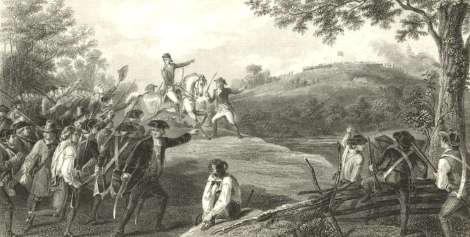On a hot summer day, July 27, 1777, John Irish, a Quaker farmer, had just finished threshing his wheat and was mowing his field on his farm in Tinmouth, Vt. when a former neighbor, a man named Clough, approached him. Clough had moved from the area when he joined the Vermont militia.
With the American Revolution under way and the countryside thick with spies, both British and American, Clough said he wanted Irish to guide him across his land so he could continue his travels undetected. Irish told him he would be safest sticking to the roads. That’s about where the agreement ends regarding the day John Irish died.
John Irish
Clough was a soldier with the Green Mountain Boys, serving under Isaac Clark in Samuel Herrick’s militia. The militia was just two weeks from fighting the Battle of Bennington when the encounter with John Irish occurred.

General Stark at the Battle of Bennington (NYPL)
Irish, meanwhile, was son of a Tory, Jesse Irish. Just a week earlier Jesse Irish had visited British General John Burgoyne at his camp in Whitehall, N.Y. and pledged his loyalty to Great Britain. Irish received paperwork assuring him of his safety should British troops approach him – provided Irish and his family stayed out of the fighting.
William Irish, John’s uncle, was less neutral. He was a loyalist. Some sources say that the Green Mountain Boys had offered a reward for his capture.
Armed with their papers, the Irish family members were safely working their land when Clough approached. Clough was not alone. He had been sent to investigate the Irish farm by Isaac Clark, his commanding officer. The intent of his mission was probably to find out where Irish stood on the war.
After Clough and Irish spoke, Irish invited him to join the family for its noontime meal. Clough declined, but he did ask for a drink of water, which Rebecca Irish, John’s wife, drew for him. Then Clough left the house and sneaked around a corner.
Irish came out of the house and Clough ran for the woods where Isaac Clark, his commanding officer, was waiting. The loyalists and the patriots have two versions of what happened next.
The Loyalist Account
Rebecca would recall that she urged John to stay inside, but seeing Clough sneak outside made him suspect the rebels were up to no good. Irish left the house, following after Clough. From the tree line, Isaac Clark and his men opened fire and shot at Irish, striking his hand.
Irish approached the men and Isaac Clark demanded to know if Irish intended to take rebel prisoners. Irish said no, and angrily showed Clark his wounded hand. Clark fired again. Irish was so close that smoke from the musket puffed against his chest as the musket ball struck him in the heart. Irish turned and fell dead.
Rebecca said that John was unarmed when shot. He had dismantled the gun he used for hunting because both British and rebels had suggested that anyone in possession of a gun would be treated as a combatant.
The Patriot Account
Isaac Clark maintained that Irish had a musket when he followed Clough from the house. Clough had begun feeling uneasy inside the Irish home. He had nonchalantly approached the door and exited without drawing suspicion.
Once outside, Clough ran for the woods. Clark, watching from the trees, saw Irish come out of the house with a gun. Fearful that Irish intended to shoot the fleeing man, Clark shot and killed him.
The Aftermath
After John Irish’s death, Rebecca ran to her Uncle William’s home. He told her he could not help her. Fearing for his own life, William fled for shelter with Burgoyne’s troops.
Rebecca and her children, meanwhile, hauled John’s body into their home. Two neighbors assisted in digging his grave and piling stones upon it.
Because of her purported loyalist sympathies, the rebels would seize Rebecca’s land and sell it. She was evicted and moved to Danby where she spent the rest of her life. A later government inquiry would declare that Rebecca was entitled to reparations. But as a Quaker, her beliefs prevented her from taking oaths in court. Her family declined to seek damages.
Rebecca always believed that Isaac Clark came to the farm looking for William Irish, and that her husband’s refusal to cooperate was the source of the murder.
Isaac Clark’s Career
Following the war, Isaac Clark would rise to political prominence in Vermont. He fought with distinction at the Battle of Bennington, just a few days after the John Irish affair.
Clark married the daughter of Governor Thomas Chittenden in 1779. Later in the Revolutionary War he was briefly involved in negotiations to have Vermont break from America and join with Great Britain.
He rose to colonel in the War of 1812 when he was charged with stopping smugglers operating between Canada and Vermont. Twice during the war he was stripped of his command, but had his position restored.
Clark would go on to become a representative in Vermont’s legislature and a judge. His political opponents, however, would not forget the events of 1777 and used the murder charge against him in political debate.
Thanks to The History and Map of Danby, Vermont, J. C. Williams and Memoirs of Col. Seth Warner, Daniel Chipman. This story was updated in 2021.

2 comments
[…] of the congregation had been Loyalists like Isaac Touro and left with him for New York. The Jeshuat Israel congregation dwindled and […]
[…] the American Revolution, Vermont was a battleground that pitted loyalists and patriots against each other, not just on the battlefield but in quiet communities like […]
Comments are closed.